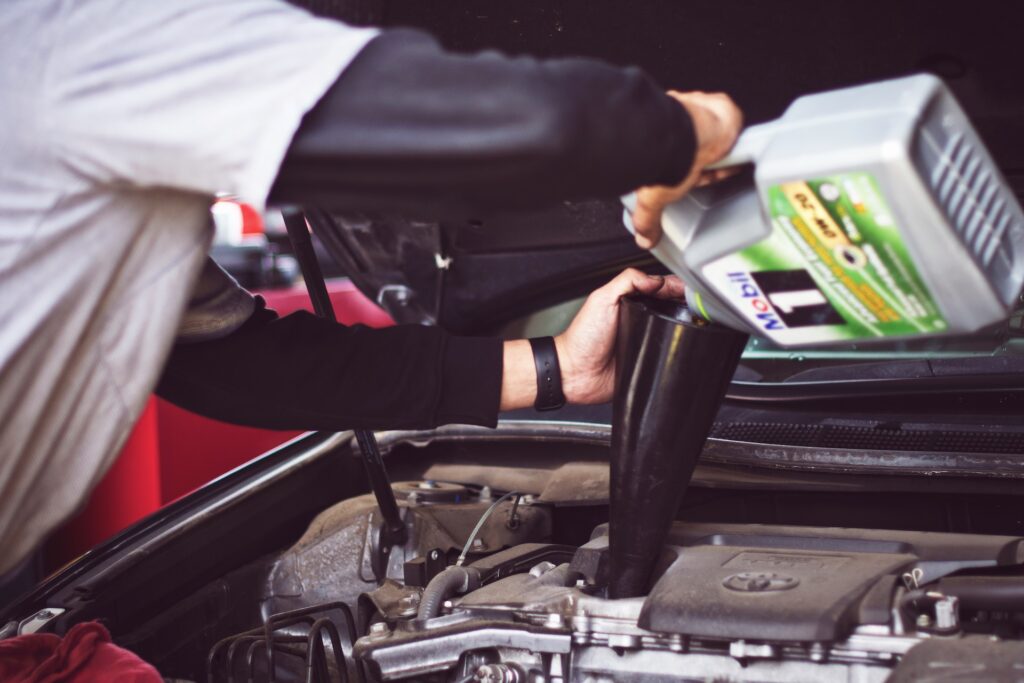A well-maintained car provides its owner with a sense of peace and safety on the road. Often, however, many car owners are unsure of how to properly care for their vehicles in a way that consistently ensures optimal performance.
Here we take a deep dive into the daily, weekly, monthly, and yearly maintenance checks critical to keeping your car running smoothly.

Daily Checks
Initiating daily checks might seem daunting at first, but with consistency, they become as straightforward as checking the weather. They involve swift visual inspections that can significantly impact your driving experience.
- Tyres: Tyres are the linchpins between your vehicle and the road. Check for potential damage signs, such as punctures, cuts, or embedded objects. An often overlooked aspect is ensuring the tyres don’t appear under-inflated or over-inflated, which can severely affect grip and handling.
- Lights: Ensuring your lights work correctly is paramount to your safety and that of other road users. Test your headlights, brake lights, indicators, tail lights, and fog lights. If some lights aren’t functioning, it could be as simple as replacing a bulb or could indicate a more significant electrical issue.
- Windscreen: An unobstructed view is crucial. Check your windscreen for any chips or cracks and ensure the wipers are in good condition. During winter months, make sure to clear any ice or frost before setting off.
Weekly Checks
Carrying out weekly car maintenance checks can prevent more significant issues further down the line by focusing mainly on fluid levels and critical components.
- Engine Oil: Your engine oil is the lifeblood of your vehicle. Using the dipstick, verify the oil level, which should ideally sit between the minimum and maximum marks. Additionally, observe the oil’s consistency. If it appears too dark, it may be time for an oil change.
- Coolant: The coolant prevents your engine from overheating. Check its level in the reservoir; it should be between the minimum and maximum markings. Remember, opening the coolant cap when the engine is hot can lead to severe burns.
- Brake Fluid: This fluid is paramount to your car’s braking system. The brake fluid levels should also be within the marked area on the reservoir.
- Windscreen Washer Fluid: Frequent usage, especially during winter or rainy seasons, can deplete this fluid swiftly. Check regularly and refill as required.
- Tyre Pressure: Correct tyre pressure impacts fuel efficiency, handling, and tyre lifespan. Using a gauge, verify that the pressure meets the manufacturer’s guidance.

Monthly Checks
Monthly checks delve deeper into your car’s overall health by checking critical elements affecting performance.
- Air Filter: The air filter is crucial for optimum engine performance. If it’s dirty or clogged, your engine must work harder, lowering fuel efficiency. Inspecting it monthly and replacing it when necessary can significantly improve your car’s performance.
- Battery: Look for any signs of corrosion around the battery terminals, evident by a build-up of white residue. Cleaning off the residue and ensuring firm connections can prevent car starting issues.
- Power Steering Fluid: This aids smoother steering. Verify that it’s within the correct range as indicated in your car’s manual.
Yearly Checks
Yearly checks generally focus on elements requiring professional inspection, but awareness can help you know when it’s time for a service.
- Timing Belt: The timing belt synchronises your engine’s functions. Check your car’s manual to identify when the timing belt should be replaced, typically between 60,000-100,000 miles.
- Brake System: Yearly checks should incorporate a complete brake system inspection, including lines, hoses, and the parking brake. Brake fluid should be replaced every one to two years to prevent the buildup of moisture, which can rust and deteriorate the brake system. Your continued safety on the road depends on it.
- Steering and Suspension: An annual steering and suspension check can ensure your car drives well and is safe. Any issues with these systems can significantly impact vehicle control, leading to dangerous driving conditions.

Intermittent Checks: Every Few Years Or Occasionally
Not every component of your vehicle needs constant monitoring. Some parts have longer life spans, and others only require checks under certain conditions. However, being aware of these less-frequent checks can help maintain your vehicle’s life span and save costs in the long run.
- Spark Plugs: Spark plugs are vital for your engine’s ignition process. A worn-out or faulty spark plug can lead to engine misfires or reduced fuel efficiency. Typically, spark plugs should be checked and replaced every 30,000 to 150,000 miles, depending on your vehicle model and the type of spark plugs it uses.
- Transmission Fluid: The transmission fluid is essential in keeping your car’s gearbox healthy by lubricating and cooling the transmission components. Most manufacturers recommend replacing the transmission fluid every 30,000 to 60,000 miles. However, some modern vehicles come with ‘lifetime’ transmission fluid meant to last the entire life of the vehicle. Check your owner’s manual for specific guidance.
- Shock Absorbers and Struts: If your car starts to bounce excessively over speed bumps or feels less controlled while turning corners, it may be time to check your shock absorbers and struts. Depending on driving conditions and habits, these usually last 50,000 to 100,000 miles before they need replacing.
- Exhaust System: While the exhaust system is built to last, it’s crucial to keep an eye out for any signs of rust or corrosion, especially if your typical driving consists of short trips where the engine doesn’t fully warm up. Excessive engine noise, decreased fuel efficiency, or unusual smells can all point to issues with the exhaust system.
- Hoses and Belts: Your car’s hoses and belts don’t have a specific replacement timeline, but experts generally recommend getting them inspected every couple of years. Pay close attention to the serpentine belt, which powers most of the engine’s accessories. If this breaks while you’re driving, it could cause significant engine damage.
- Air Conditioning System: The air conditioning system doesn’t need frequent checks, but it’s a good idea to have it serviced every 3-4 years. If you notice a decrease in cooling efficiency or any unusual noise, it’s time to have it checked.
- Cabin Air Filter: A less-known component, the cabin air filter, is responsible for the air quality inside your vehicle by filtering out dust, pollen, and other pollutants. Depending on the environmental conditions and car usage, they should be replaced every 15,000 to 30,000 miles.
Overall, while these checks occur less frequently, their importance should not be understated. Maintenance is about the detail, and the best approach to keep your vehicle running in top shape is comprehensive care, whether the checks are daily, weekly, monthly, yearly, or intermittent.

Car & Model Specific Maintenance Checks
While general maintenance applies to most vehicles, certain makes and models require specialised attention for optimal performance.
Premium German Vehicles: Mercedes-Benz models feature sophisticated systems requiring expert care. The manufacturer recommends service every 15,000 miles or annually. A visit to an authorised Mercedes-Benz service centre ensures technicians with specific training can properly maintain these advanced systems and perform essential electronic updates that independent garages might lack access to.
BMW vehicles similarly need attention to their unique systems including Vanos components and cooling system integrity, particularly on models known for specific issues.
British Models: Jaguar vehicles require checks on supercharger oil (when equipped), adaptive dynamics calibration, and differential fluid, especially on performance variants.
Japanese Makes: Toyota and Lexus hybrid systems need regular health checks, while Nissan owners should monitor CVT transmission fluid condition and timing chain components.
American and Electric Vehicles: Ford’s EcoBoost and PowerShift systems need specific attention, while electric vehicles from all manufacturers require battery diagnostics and high-voltage system inspections at qualified service centres.
Remember that following manufacturer recommendations not only ensures reliability but also helps maintain resale value, particularly for premium vehicles where a full service history at authorised centres significantly impacts future value.
The Bottom Line
Regular maintenance checks not only extend your vehicle’s lifespan but also contribute to your safety and others on the road. Although this guide is comprehensive, remember that each car model may have specific maintenance requirements provided in the owner manual.
Maintaining your car is not merely about keeping it on the road but reinforcing your safety and ensuring each journey is smooth and enjoyable. Cheers to that (when you’re all safely parked up, of course)!





